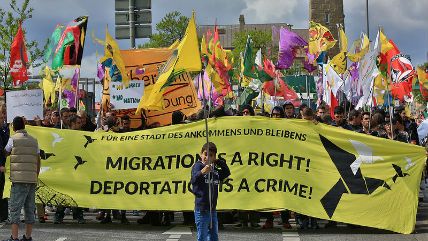No Short-Term Bad Effects on Native Employment or Most Crime Rates from German Migrant Influx, Study Finds

Given the volatility of the political debate over migrants coming into Western democracies, a pair of economists in a study for the Centre for European Economic Research decided to see what they could learn from the countable effects, so far, of the 2014-15 migrant wave in Germany on "labor markets, crime, and voting behavior."

The study, by Markus Gehrsitz (University of Strathclyde) and Martin Ungerer (Centre for European Economic Research), states that its "main goal…is to use this sharp and unexpected rise in the number of migrants coming to Germany in 2014/2015 as a natural experiment in order to evaluate its effect on unemployment, crime, and voting behavior."
What effects did they find?
We find little evidence for displacement of native workers by refugees. However, our findings suggest difficulties in integrating refugees into the German labor markets….
Our study also suggests that - with the obvious exception of violations to right-of-residence and asylum laws - there is no association between the number of refugees and the number of street crimes in Germany. However, we do find a statistically significant relationship between bigger reception centers and drug crimes and fare-dodging, as well as the number of non-German suspects in relation with theses crimes. This might partly be driven by higher alertness of police in these counties. In general, crime only increased marginally more in counties which received larger refugee inflows.
Finally, there is no indication that (micro-)exposure to refugees either increases or decreases propensities to vote for anti-immigrant parties or affects voter turnout.
As above, they did not find refugee flows seeming to affect native employment. But this doesn't mean there isn't some sign of labor market difficulties associated with the migrant inflow:
larger inflows of migrants are associated with increases in the unemployment rate for workers who are not German citizens…a one standard deviation increase in migrant inflows is associated with a 1.2 percentage point increase in the unemployment rate for foreigners. Given the 2013 average unemployment rate for this group, this estimate translates into about a 7.6 percent increase.
There are two plausible explanations for this striking increase in non-German unemployment. For one, refugees may have displaced some non-German workers and pushed them into unemployment. This may very well have happened through the shadow economy as refugees can only legally enter the workforce once their asylum claim has been approved.
A second explanation is that recently arrived refugees themselves start to show up in the unemployment statistics. This would indicate difficulties of the German labor market to immediately absorb this influx of additional job seekers. There is some evidence supporting this causal chain…
…the marked increase in non-native unemployment which parallels the increase in the number of immigrants who were granted asylum (and thus became eligible to work) indicates substantial difficulties of the German labor market to absorb this labor supply shock, at least in the short-run. Not surprisingly these difficulties tend to be more pronounced in counties that received larger refugee in flows.
For more granular information on whether refugees seemed, in the short term, to increase support for anti-migrant parties in Germany, they find some effect on the national level of the migrant influx, but that "these gains were no more pronounced in counties that actually received larger inflows than in those with smaller inflows of migrants….We also find no indication that more voters took to the ballots in counties with larger refugee inflows. In fact, turnout is by and large uncorrelated with refugee inflows."
Higher migrant inflows did seem correlated with loss of support for incumbent parties in general, though: "a one standard deviation increase in refugee inflows is associated with a loss of 4.5 percentage points in the share of votes cast for the incumbent party."
The authors also examined the same trends prior to the migrant influx which gave them additional confidence that:
The identifying assumption under which these results are most credible is that trends in employment, crime, and voting behavior would have been the same in high migration counties as in low migration counties in the absence of refugee inflows. We have provided evidence that suggests that this is a fair assumption to make.
The data they have, as early as it is, shows no signs of quick and clear deleterious effects in Germany post "migrant crisis" involving, as the authors conclude, "more than a million" migrants entering Germany in 2014-15 on native employment, crime, or anti-immigrant politics specifically linked to the presence of migrants on the county level.


Show Comments (150)